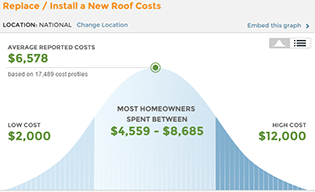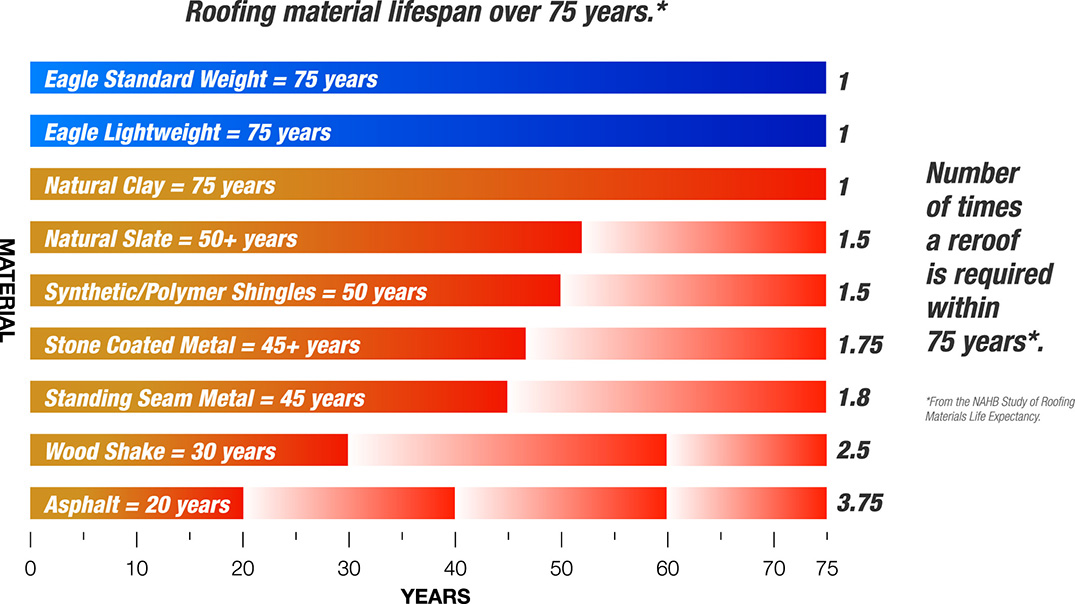Roof Replacement Cost
Replacing a roof can be quite nerve-wracking, especially when you’re not sure what the damage to your savings will be. Fortunately, planning ahead for a roof replacement project can alleviate a lot of that anxiety—as can understanding how your roof will impact project costs.
Generally, you can expect to spend between $4,000 to $10,000 for a standard asphalt roof, which is by far the cheapest material available. However, the actual cost of your roof replacement will depend on many factors: the size of your roof, the steepness of its slope, the material you choose, the market price in your area and more. Here’s how these variables may impact the cost of your roof replacement project.
How Roofing Material Affects Cost
One major factor affecting the final price of your roofing replacement is the type of material you choose. Many materials, like slate shingles or clay tiles, are much more durable, but investing in these materials will typically cost more. Below, we’ll examine some of the most popular types of roofing and their average costs.
Asphalt Shingles
Asphalt shingles are by far the most prevalent choice among homeowners for roofing, and for good reason: they’re affordable, relatively durable, and have a classic, attractive look. These shingles are composed of a fibreglass or paper mat covered in a mixture of asphalt and minerals. These asphalt-covered mats are then topped with crushed rock, also called granules, and then coated with a protective sealant to keep out the elements.
Homeowners can choose from three different types of asphalt shingles:
- Three Tab Asphalt Shingles. This is the most basic type of asphalt shingle, and the cheapest. They have a simple, square pattern that looks much like bricks laid in a wall. The average cost for three tab asphalt shingles is $0.75 to $0.90 per square foot.
- Architectural Asphalt Shingles. Architectural asphalt shingles are designed to add three-dimensional texture to your roof, improving its aesthetic appeal. Because of this, they are a little more expensive than standard asphalt shingles. Expect to pay between $1.40 to $1.80 per square foot for architectural shingles.
- Premium Asphalt Shingles. Premium asphalt shingles add just a little bit more personality to your home’s exteriors. They come in unique shapes and colors, and of course, cost a little more. Homeowners that install premium shingles typically spend between $2.25 to $2.50 per square foot.
Keep in mind, however, that although asphalt shingles have a lower cost-per-square-foot than other materials, the lifetime cost may be higher because these roofs will need to be replaced more frequently.
Metal Roofing
Metal is the second most frequently installed roofing material. These roofs are composed of copper, aluminum, zinc, galvanized steel, or some combination of these metals. This makes them much more durable and wind-resistant than other materials. They also reflect heat, rather than absorbing it, making metal roofs a popular choice for homes located in areas with extreme climates.
There are two ways to install a metal roofing: metal shingles or standing seam, long vertical interlocking panels of metal. Standing seam roofs typically range between $7.00 to $14.00 per square foot, while granular-coated shingles average around $8.00 to $10.00.
However, the actual cost to install a metal roof will depend largely upon the type of material you choose:
- Copper Roofing. As a highly valuable metal, copper is the most expensive type of metal roofing. Copper roofing costs between $8.00 to $15.00 per square foot, making it much pricier than other choices.
- Aluminum Roofing. Aluminum is a durable—and more affordable—alternative to copper roofing. It’s also one of the most energy efficient materials. Expect to spend around $1.50 to $6.00 per square foot for this choice.
- Zinc Roofing. Zinc has unique properties that allow it to “heal” from scratches and minor damage, as well as being naturally corrosion-resistant. You’ll pay a small premium for these features; zinc typically runs between $6.00 to $10.00 per square foot.
- Steel Roofing. Steel is one of the strongest metals available, and certainly the strongest option for its price. There are three different types of steel roofing:
- Stainless Steel. This material consists of steel mixed with chromium, allowing the material to be very corrosion-resistant. Stainless steel roofing costs around $4.00 to $12.00 per square foot.
- Galvanized Steel. Galvanized steel is a layer of steel coated with zinc, also designed to resist corrosion. However, it is not as effective at rust-proofing as stainless steel, but it is more affordable. Galvanized steel is around $1.50 to $3.50 per square foot.
- Galvalume. Galvalume is made of a steel core, coated with a mixture of aluminum and zinc, making it more corrosion-resistant than standard galvanized metal. It is also more pliable. This material costs $0.75 to $2.00 per square foot.
Terracotta Tiles
Terracotta—kiln-fired clay tile—is a unique and aesthetically-pleasing roofing choice. They are naturally fireproof and energy efficient, especially in warmer climates. However, they are also extremely fragile, and prone to leaking if not properly installed. Still, many homeowners are drawn to their appearance.
Terracotta tiles cost between $6.00 to $15.00 per square foot. However, the final cost to install this type of roof may be much greater than those made from other materials. That’s because terracotta roofs should be installed by highly trained experts that specialize in their installation, in order to avoid leaks, damage to tiles, and other problems.
The quality of the tile will also determine its price. Terracotta tiles come in three different grades: grade one, which are freeze/thaw resistant and nonporous; grade two, which can withstand mild to moderate freezes; and grade three, which are only recommended for warm, mild climates.
Concrete Tiles. Concrete tiles are a popular choice for homeowners who want the benefits of terracotta tiles without the cost. Because concrete is molded, it can be shaped to mimic the appearance of more traditional materials, like terracotta, wood shakes, slate tiles and more. However, they are much heavier, and more prone to mildew.
Concrete tiles typically range between $4.00 to $9.00 per square foot.
Slate Tiles. Slate is another premium material with a unique appearance and high cost. Like terracotta, it is fire-resistant and environmentally-friendly, as well as very fragile and difficult to install. It is also fairly expensive, particularly when you factor in installation costs, since it will require specialized expertise in order to install.
Expect to spend between $6.00 to $8.00 per square foot for a slate roof.
Wood Shingles and Shakes. Homeowners looking for a more traditional look can opt for wooden roofing materials, either shingles or shakes. Shakes are rough-hewn split logs, while wood shingles are milled to produce a flat surface. These roofs are prone to mildew, mold and rot, making them unsuited to wet, humid environments.
Wood shakes cost $6.50 to $11.00 per square foot, while shingles are slightly more affordable at $4.50 to $9.00 per square foot.
The Cost to Replace a Flat Roof
Most homes have a pitched roof—that is, one with a slope from the top of the roof to the gutters. However, some homes, particularly many modern-style house plans, have completely flat roofs. Flat roofs require different materials, designed to withstand rain and prevent leaks, since flat roofs do not have gravity on their side when it comes to runoff.
Popular flat roof materials are PVC membrane, EPDM rubber, TPO, modified bitumen, built-up roofing, and spray-on roofing. The cost to replace a roof with one of these materials ranges between $5.00 to $10.00 per square foot. Keep in mind, however, that flat roofs are very prone to leaks, so you’ll want to find a contractor with experience replacing flat roofs—and that may add to the price.
How Roof Size Affects Cost
Larger roofs use more materials and take more labor hours to complete. Because of this, the cost to install a large roof will be significantly more than it may be for smaller homes.
How Pitch Affects Cost
Roofing is a hazardous job, and when a home’s roof is very steep, it adds to that danger. If your roof is very steep (more than 6:12 pitch), it will require additional safety equipment, protections and planning to keep the roofing team safe while working. This can add labor hours and fees to your project, increasing your overall costs.
Likewise, a roof that is very flat may require additional expertise and underlayment to make the home fire- and leak-proof. For this reason, it may also cost more to reroof a home with a flat roof.
How Geography Affects Cost
Just as the cost of a home varies depending on the market it’s in, so home improvement project prices differ from place to place. Before signing a contract for a re-roofing job, you may want to investigate the average cost of a re-roofing project in your area in order to give you some sense of the market price.
It’s also recommended that you gather at least two to three bids before choosing a roofing company, which will also help you understand if you’re getting a fair price for your project.
There are other factors that may influence costs, as well, such as how easy it is for your roofer to access your roof, or whether there are complicated features on the roof, such as fascia or complex gutter systems. However, it may be difficult to estimate how these will add to costs ahead of time.
Again, your best bet for ensuring that you get a fair cost for your project is to collect multiple bids beforehand—and compare those to the company’s reviews online (or ask to see references). After a positive experience, 83% of customers would be happy to provide a referral so by comparing reviews you’ll know you’re getting a good contractor for a fair price.




